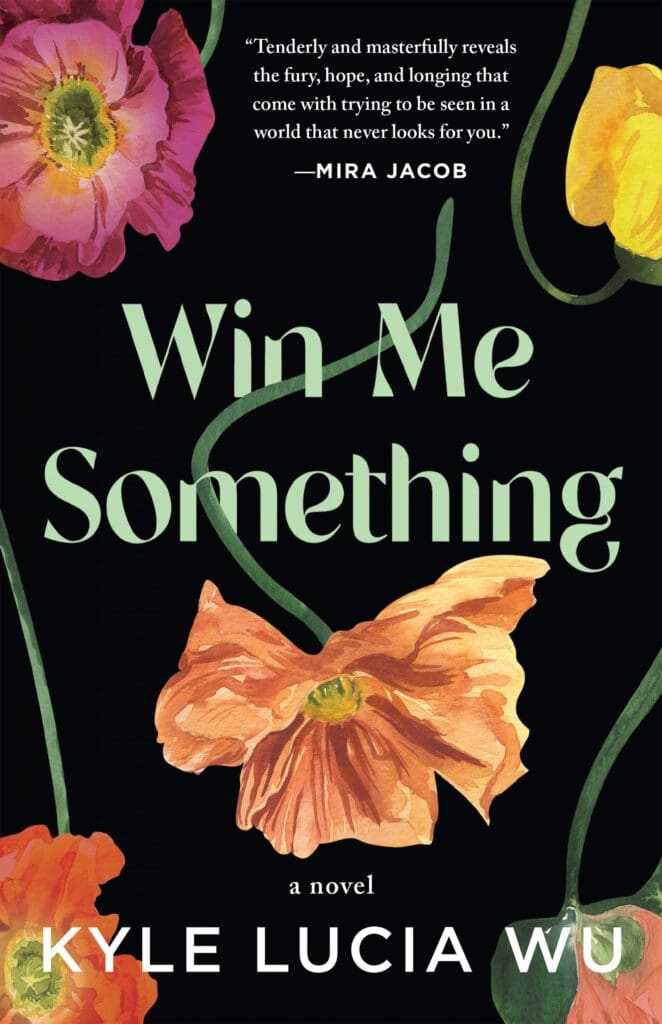Reading Kyle Lucia Wu’s first novel, Win Me Something (257 pages; Tin House), feels like listening to a friend tell you about her life straightforward and true. The main character, Willa Chen, a 23-year-old working-class Brooklynite who thinks her life has lost direction, proves immediately relatable. The first-person narration seems to come from her very soul, yet this directness belies a beautifully understated poignancy contained in Willa herself: though she may seem unremarkable at first, she is a deeply scarred, isolated individual.
Willa lives in Crown Heights in a tiny apartment with a roommate who is more often than not away visiting her boyfriend. When Willa is hired as a nanny for a wealthy family in Tribeca, she hopes the job will be more satisfying than her gigs at a bar and a coffee shop. Looking after nine-year-old Bijou Adrien is certainly different from anything Willa has ever experienced—for one thing, Bijou is an aspiring chef and a far more prodigious cook than Willa—but even when she becomes a live-in nanny with the Adriens, Willa remains out-of-place, under-appreciated, and lonely.
This isn’t Willa’s first experience with feeling like an outsider. As a biracial Chinese and white woman, she’s used to not fitting in. She is accustomed to dealing with racist taunts from white people, slights which her white mother never understood unless she explained them to her. She’s used to the lack of kinship Chinese people feel toward her, and senses their disdain that she doesn’t know a word of Mandarin despite, even as she takes Bijou to weekly Mandarin classes. Working for the white Adriens heightens Willa’s awareness of her own race, and she often feels obligated to put them at ease whenever they make a racist blunder.
Willia’s upbringing also lends to her feelings of loneliness. Her parents divorced before she was born, and she grew up with her loving yet often neglectful mother. When her mother remarried and had another child, Willa felt unwelcome in her own house, like she was intruding on her mother’s new family. The situation at her father’s house wasn’t any easier: Willa’s father had also remarried and had two daughters. And though he was perfectly at ease with his new family, he didn’t seem to know how to treat Willa. As she puts it, “If you’re undercared for, but essentially fine, what do you do with all that hurt, the kind that runs through your tendons and tugs on your muscles, but doesn’t show up on your skin?”
Through chapters showing Willa’s life from when she was eight to when she was a teen, we see how her history shapes her approach to her job and her present life: when she is first hired by the Adriens, she isn’t quite sure how to look after Bijou, because nobody looked after her when she was young. Willa has little in the way of a support system, remaining self-reliant just like when she was a child.
By nannying, Willa hopes she might learn how “normal” families function, and even dares to dream she might be accepted as one of the Adriens, whose wealth makes them anything but the average family. Bijou’s mother, Nathalie, constantly offers Willa expensive and unused clothes, cosmetics, and hair care products simply because she is no longer interested in them and would otherwise throw them out. What Nathalie sees as clutter, Willa sees as luxuries. Willa hoards these items, even the ones she has no intention of using, purely because she knows she could never afford them otherwise. Owning Nathalie’s pricey junk makes Willa feel almost as if she is on par with her, as if she is a part of that family.
In many ways, the Adriens seem oblivious to the reality that not everyone lives like them. Nathalie assumes Willa is also constantly throwing out old luxury items even though she barely makes enough money to pay rent. Nevertheless, the Adriens are conscious of Willa as an outsider, even after she has moved in with them. When the Adriens host parties, it is her responsibility to look after everyone’s needs, preparing meals and refilling drinks, even as she is also expected to engage in friendly banter with the other guests as if she was one herself. And though the family never overtly mentions Willa’s race, they make enough insensitive comments for her to know she is not, despite what Nathalie may claim, practically like family. The Adriens’ treatment of her proves otherwise. Win Me Something is light on plot but rewardingly hones in on the rich character of Willa. The writing is thoughtful and moving, and Willa’s relationship with the Adrien family offers incisive yet elegant commentary, making the novel as subtle as it is poignant.

